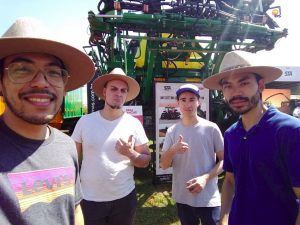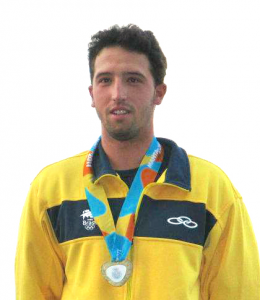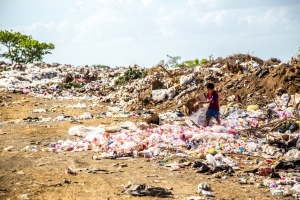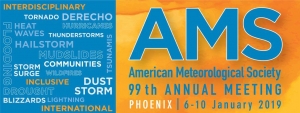Posts
Interview with Rafael Abreu
/in Blog /by mbyarker Rafael Abreu: Starting up a meteorology business
Rafael Abreu: Starting up a meteorology business
Rafael Abreu is a 27-year-old entrepreneur for Oráculo Meteorologia, who provides weather and climate prediction solutions for farmers across Brazil. He is also a PhD student at the University of São Paulo (USP) in Brazil studying the impact of land use change, especially urbanization, in variability of temperature and precipitation. Prior to becoming an entrepreneur, he studied meteorology at USP where he discovered a love of coding, particularly in GrADS, Shell Script, HTML, Javascript and Python. Meteorologists commonly use these languages to analyze data, but he also uses them for backend web development for both his PhD research and at Oráculo Meteorologia. He believes that being successful requires problem solving skills, being open to new ideas, and collaborating with others and credits his combined experience of being a researcher and being part of a startup business for helping him develop these key skills.
In a discussion with Michel and myself, he shares the struggles and successes they had while building the business, but especially how utilizing startup strategies in particular turned their business into a profitable company.

Morgan & Michel: What drove you to study meteorology?
Rafael Abreu: I was always fascinated by atmosphere phenomena like thunderstorms, cloud formation, rainbows and such. When I discovered that meteorology course had a big emphasis in mathematics and physics, which were my main interests during high school, I decided to apply for it. Since when I got into the university, I saw that it was no easy task to graduate, but the interest remained and opened a broader range of possibilities to learn new things like statistics, coding and much more.
M & M: Could you tell us a bit about your company ‘Oráculo meteorologia’?
R A: Oráculo Meteorologia is a company that uses weather and climate prediction to help farmers in Brazil better manage their crops. The company was funded in 2015 and has five partners: myself, Takao (CEO), Takashi (Designer) and Matheus (Meteorologist) and Tiago (Meteorologist). We engage in farmers’ day to day activities, such as issuing alerts if there are any nearby thunderstorms that could disturb their operations: such as spraying and planning the best windows to plant and harvest.
M & M: What gave you the idea to create your company?
R A: Matheus studied meteorology with me at USP and he pitched me the idea to build a weather company from scratch. Without knowing exactly what to expect I decided to get onboard, because by the end of my undergraduate degree I was feeling that meteorology was not really appreciated in Brazil, and I was eager to do something about it. All of the partners shared the same motivation. When the company started, we tried to replicate some big weather companies in Brazil, which didn’t gave much results since we had a lot less resources in personnel and technology. Then, we started digging into the concepts of startups, how the Silicon Valley was formed, and many other success stories from other companies and decided to use those strategies in our business, which was when the team became more focused and our first customers started to show up.
M & M: That is an amazing story! What were the new strategies you tried that eventually helped your company succeed?
R A: Takao, who is the CEO, is the main person responsible for making sure the company incorporates proper startup strategies. For example, he developed the brand and made sure we focused on specific target markets to develop a solution that delivers value before expanding to other sectors and other markets. The concept of Minimum Viable Product (MVP) was also essential for us, because in the beginning we made a lot of mistakes. We spent a lot of time trying to build the perfect piece of software that we, as developers, thought customers would want. However, reality showed us that this is not always the case, and customers weren’t really interested in the software we made. We then tried to build a simpler product, testing it with WhatsApp and talking closely with our target market to understand what key information they need and how they needed it to be displayed. Only after validating this information did we start developing the mobile app. We learned all of these concepts mainly from the internet, through websites like Endeavor and TED talks. Also, we went through an acceleration program from Startup Farm, a well known company in South America, on Google Campus São Paulo, that helped us to build this kind of knowledge.
M & M: Those procedures are definitely key processes for startup companies, and it sounds like it really worked for you! Even after a round of being not so successful. That is an important lesson for others who want to start a business. What other challenges did you face while starting up the business?

R A: The biggest challenge is to be outside your comfort zone, which means you face a lot of uncertainty. Starting a new business from scratch means you might take some time to start making some money, which could put some constraints in your budget. Also, we needed to learn a lot of different things because we have only a few staff members. Learning things like finance, marketing, web and app development, etc. takes a lot of time, hard work and especially patience. For the app specifically, the challenges were related to our expertise to do so. With no experienced programmer, we had to learn by ourselves how to code the app and distribute it for iOS and Android, which was done mostly by Takashi. Also, I had to learn more about web development, something that is unfamiliar for meteorologists, to develop APIs that feed the information to the app. Besides that, it takes a lot of trial and error, changes in the layout, and lots of feedbacks from the users to find a good match for the customer. Although we think we have a good app, there is always room for improvement.
M & M: Constantly improving to fit the needs of your customers will be key to keeping you in business! With that in mind, where do you see yourself and your company 5 years from now?
R A: The best scenario for us would be to have a lot more users for our app and to be seen as a trustworthy company for all farmers in Brazil. Hopefully we can also serve as an inspiration to meteorology students in Brazil to try to follow this path. Maybe by setting an example as a case of success this could lead to other startups that in turn would generate more jobs and a bigger appreciation for this science that is intertwined in everyone day to day lives.
For more information on Oráculo Meteorologia, how to build a startup, and tips for entrepreneurial meteorology, check out our blog, social media, and the links below!
Oráculo Meteorologia: http://www.oraculo.me/
How to Build A Startup: https://www.udacity.com/course/how-to-build-a-startup–ep245
Morgan & Michel
Podcast: Joao Hackerott
/in Blog /by mbyarkerPodcast: Interview with João Hackerott
If you are an educated meteorologist, chances are you don’t have much training in how to start or run a small business because business class requirements are non-existent in most meteorology programs. However, there are meteorologists who have managed to grow businesses selling meteorology products and services.

João A. Hackerott, Phd
One example is Dr. João Hackerott, who started his company when he was a PhD student at the University of São Paulo in Brazil. He used his skills as a academic and experience as a competitive sailor to create forecasts specifically for his customer’s needs. Michel and I talked to João about the challenges of running a small meteorology business, how he transferred from academia to entrepreneurship, and his advice for any meteorologist interesting in starting their own small business.
For more information about Entrepreneurial meteorology, check out prior blog posts or reach out to us via our contact form or through social media.
Thanks for listening!
Morgan & Michel
Intro to EntreMet
/in Blog /by mbyarkerVideo: What is Entrepreneurial Meteorology & why should you care?
If you visited our poster at the American Meteorology Society’s annual meeting last month, you might have heard the term Entrepreneurial Meteorology. If you haven’t heard it, you are probably wondering what the heck it means. Well, wonder no more! This 1 minute video gives you the definition and explains why all meteorologists should be familiar with it- even if you aren’t an entrepreneur!
Thanks for watching! If you are interested in learning more, please reach out to us on social media or through our contact form.
-Morgan
AMS 2019 Activities
/in Blog /by mbyarkerInteract with Yarker Consulting at
The AMS Annual Meeting
Yarker Consulting and its partners are heading to Phoenix this weekend for the American Meteorological Society’s (AMS’s) annual meeting. The government shutdown has had a significant impact on the conference, in largely negative ways. However, we have been working hard all year to prepare for this event and are excited to share our work, learn new things, and network with our colleagues who are able to attend. If you will be joining us in Phoenix this week, be sure to check out as many of these amazing activities as possible.
Saturday
Our intern, Antoinette Serrato, will be attending the Student Conference. Sessions include conversations with professionals, Introductions to various careers in the field, and the always popular Career Fair.
Sunday
9:00am – 3:30pm Early Career Professional Conference
One of the best things about the ECPC is the networking. This group does networking right because they provide excellent guidance and ample opportunity. In particular, the 9:00am session will include an exciting guest from Improv Science that you won’t want to miss!
Be sure to grab your lunch (included in the ECPC registration fee) and do some active learning in our Mock Trial! You will have the opportunity to evaluate scenarios from legal cases with the support of experienced Certified Consulting Meteorologists (CCMs), including our Founder, Morgan and our partner, Jared. This event is sponsored by the Association for Consulting Meteorologists.
Other sessions include discussions about managing mental health, non-traditional careers, and outside of the box skillsets.
5:00pm – 6:15pm Early Career Professional Conference Attendee Networking Dinner
Need plans for dinner? No problem! Join the rest of the ECPC attendees for dinner and conversation. It’s a great time to get to know your peers better and meet new people!
8:00pm – 9:00pm Association for Consulting Meteorologists Informal Gathering
Have you ever thought about getting your CCM? Ever wonder what kinds of consulting work meteorologists do? This is the perfect opportunity to explore the world of consulting meteorology! Bring a friend to this informal get-together to meet current ACM members and ask those burning questions. Message our Founder (also an ACM Board Member) for more information and the location.
9:00pm -11:00pm Early Career Professionals Reception
As I said, this group does networking well! Another opportunity to mingle with other ECPs. This event is open to all, so bring a friend!
Monday
Keep an eye out for Badges that have a special sticker. AMS is piloting a brand-new Teacher Travel Grant program and is bringing six K-12 teachers from across the country to the meeting so that they can network with scientists, learn about the latest research, and collaborate with other educators. Most of these teachers have never been to AMS before, so if you see one, be sure to say “hi!”
10:30am – 12:00pm Early Career Leadership Academy
Both our Founder and Partner participated in the inaugural Early Career Leadership Academy in 2018. Learn from a few member’s experiences and future classes of ECLA. I highly recommend this program, and anyone interested should definitely attend this session!
10:30am – 12:00pm Active Learning Demonstrations
The Education Symposium is exploring alternative presentation styles with an Active Learning session Monday morning. Pop in and participate in a few demonstrations!
4:00pm – 6:00pm Education Symposium Poster Session: A Case for Entrepreneurial Meteorology
Yarker Consulting’s very own Intern, Antoinette Serrato, will be giving her first AMS presentation at this poster session! A collaborative project between Yarker Consulting, m2lab.org, and Sales and Marketing, Inc. provides a case for why students and professionals should have exposure to entrepreneurial meteorology. Be sure to stop by and say, “hi!” We would love to see you there!
Tuesday
3:00pm – 4:00pm Education Symposium: Using Alternative Presentation Formats to Inform Your Audience
As educators, we recognize the value of exploring alternative ways to present information to audiences. Our Founder is stepping in as a substitute chair for this session, where several authors will present new and innovative ways to educate.
See you in Phoenix!
-Morgan
Environment and children
/in Blog /by mbyarker3 Ways in which Climate Uncertainty is Impacting Children
Michel d. S. Mesquita, PhD
I have been part of a number of climate studies, meetings and conferences. While discussions often have focused on modeling (my field), policy, water cycle, energy, among others- very little has been about the effect climate change could have on children. But with the recent release of the Fourth National Climate Assessment, it is appropriate to consider the impact climate uncertainty has on our most vulnerable members of society.

Source: Photo by Caleb Woods on Unsplash
1. Children are one of the most vulnerable groups exposed to new disease
The Zika virus epidemic in Brazil is a recent example on how vector borne diseases have affected children already now. It’s reported that about 4,000 babies were born with microcephaly due to the Zika virus (1). This is a condition in which a baby head is small compared to their body size, with consequences to their proper neurodevelopment.

Source: Photo by Hermes Rivera on Unsplash
The Zika virus is transmitted through the Aedes mosquito. These mosquitoes thrive in warm temperatures and water puddles left unchecked. Open sewage, as a result of improper infrastructure, is also a field for the proliferation of even more mosquitoes. Since its discovery, Zika-carrying mosquitos have migrated as far north as the Southern US, impacting communities across South, Central, and North America. In an uncertain future climate, Zika could become a major epidemic, affecting even more children.
2. Children’s life-long health is a direct result of the quality of their air
Air pollution is another threat to children’s well being. A quick Wikipedia search under the topic “street children” shows that about 100 million children grow up in the streets. Many live in large urban areas of densely populated and air polluted cities.

Source: Photo by Viktor Juric on Unsplash
When these children are exposed to smog, PM2.5 particles, which stands for particulate matter of the size of 2.5 micrometers, deposits in their lungs. They may impair the lung function, since they can penetrate deeply into the alveolar wall and bloodstream. Life-long health issues develop as a result of excessive PM2.5 exposure. For street children, health care is not an option, which is why their survival rate is not high (2). Since meteorological conditions may affect the concentration of PM2.5 in the atmosphere, a combination of future changes in weather conditions and policies concerning pollution may influence considerably the future of street children. As a result, air quality poses a threat to children’s survival.
3. Children face high levels of stress at young ages
As environmental threats become more common and their impacts less certain, stress becomes an ever-persistent emotion, for adults as well as children. The recent California fires and the devastation of Paradise, a town located about 3 hours from San Francisco, showcases how stressful it can be for families. Many have lost their homes, others have lost their loved ones, or both. For children having to evacuate or miss their home, pets, family members, it must be devastating. Such stressful conditions could potentially affect their future development. This is just one example of an serious of natural disasters in recent years, which has put families in difficult positions physically and financially
Uncertainty in climatic conditions is already affecting children. More studies are needed to understand what the future could bring to these small ones. By then, many will have become adults and will already be seeing their own children being affected as well.
1 The Guardian (2018), URL: https://www.theguardian.com/world/2018/jul/20/zika-epidemic-sheds-light-on-brazils-invisible-children
2 *What About America’s Homeless Children?: Hide and Seek: https://tinyurl.com/ybfxezfz
*not many studies are available on mortality, a study mentions that it can be 10 times higher compared to a regular person at the same age group.

Contact Information
Phone:
1-319-849-5611
Email:
morgan@yarkerconsulting.com

